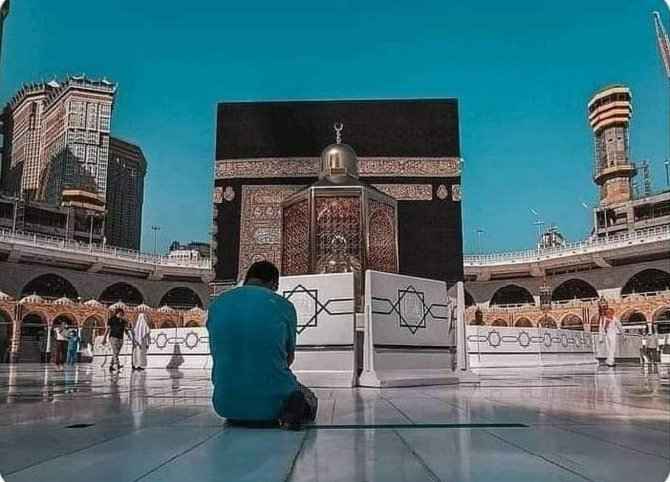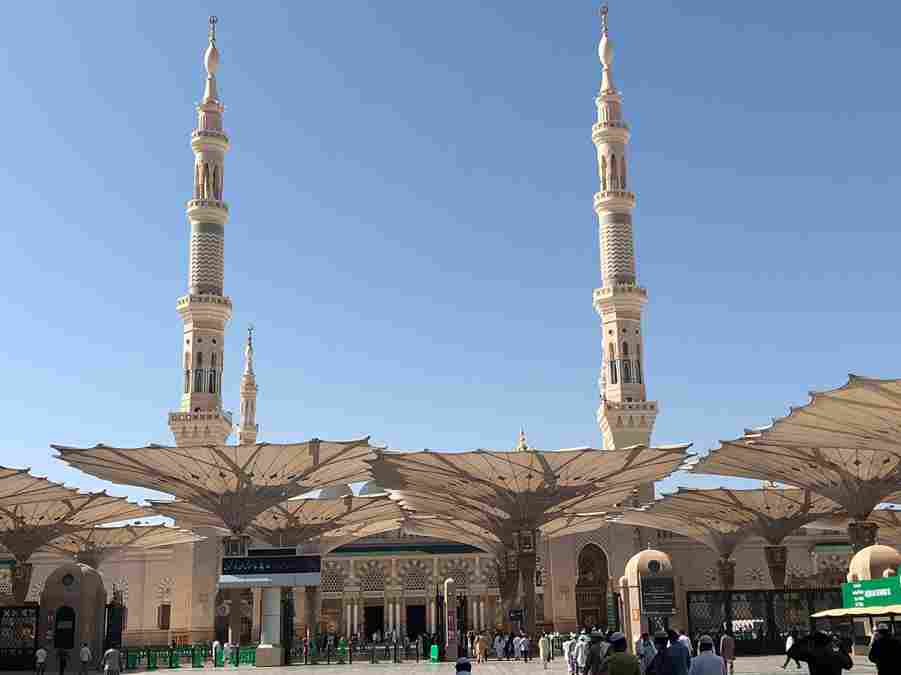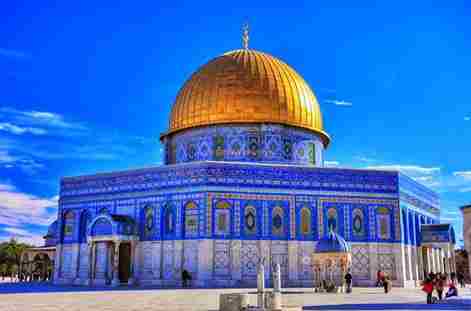Islam is one of the three monotheistic religions known as the Abrahamic religions ( Judaism, Christianity, Islam), and it is the second most followed religion in the world. The general meaning of the word Islam is complete submission to the Creator by monotheism, submission to him with obedience, and disavowal of polytheism and its people. It is a complete surrender of man to God in all aspects of life and dominion over it . Muslims also believe that Muhammad is a the last messenger from God and the seal of the prophets and messengers, and he was sent to all the two races ( jinn and mankind ). And one of the foundations of the Islamic faith is the belief in the existence of one God, Allah, and that they follow the Hanif religion Ibrahim.
Muslims believe in angels, all previous messengers of God, previous books, the Last Day, and destiny, good and bad. And the Qur’an is the book revealed from God to Muhammad through Gabriel. The Qur’an is the first source of Islamic legislation, and the Sunnah is the second.
A person is a Muslim who is obedient to the Islamic belief system and belief on the five pillar of Islam. The following are the 5 pillar of Islamic faith
As for the pillars of Islam, they are five pillars:
1: Testifying that there is no god but God and that Muhammad is the last Messenger of God
2: establish prayer
3: Paying the zakat
4: Fasting Ramadan
5: Hajj for those who can afford it.
According to the Qur’an, Muslims believe in God, His angels, His books, His messengers, and the Day of judegment. .
Muslims believe that God is the one God who created the universe with everything in it. God revealed to Muhammad (PBUH) through Gabriel the Qur’an, which is the final message to the messages sent by the prophets who preceded him. The prophets are men chosen by God to be His messengers. Muslims believe that the prophets are human beings and not gods, although some of them were granted by God the ability to perform miracles to prove their prophethood.
Prophets in Islamic belief are considered the closest to perfection from humans, and they are the ones who receive divine revelation, either directly from God or through angels. The Qur’an mentions the names of several prophets, including Adam, Noah, Abraham, Moses, Jesus, and others. According to the Qur’an, all the prophets were Muslims calling to Islam, but with different laws. Islam is defined in the Qur’an as “the fitrah of God with which He created people” Muslims also believe that Hanifism is the basis of the religion of Abraham. They see that the difference between the Abrahamic religions is only in the Sharia and not in the faith and that the Sharia of Islam abrogates the laws that preceded it. This means that the Islamic religion consists of dogma and law. As for faith, it is a set of principles that a Muslim must believe in, and it is fixed and does not differ
Muhammad, the last messenger of God, is the founder of Islam. He started preaching Islam from his home. For the last twenty-three years of his life(610-632), beginning at the age of forty, Muhammad received a revelation from God through the angel Gabriel, the Quran, which was memorized and recorded by his followers.
During this time, Muhammad worked to preach to the people of Mecca, persuading them to abandon polytheism and worship God alone. But the Prophet Muhammad and his followers were persecuted by the Meccan tribal leaders. After 13 years of proselytizing, Muhammad and the Muslims migrated to Medina (formerly Yathrib) in 622 CE. There, many of the people of Medina converted to Islam and were known as the Ansar, and the immigrants from Mecca were known as the Muhajireen. Muhammad obtained political and religious power in Medina.
Islam appeared in the Arabian Peninsula in the 6th century AD at the hands of Muhammad bin Abdullah , who began to call people to embrace a belief that calls for the worship of the One God and to leave idolatry, in addition to another set of rules, ideas and beliefs ordered by God, the One and Only (God) in addition To an Arabic Quran that was revealed to Muhammad from God through the angel Gabriel, who used to recite this text to Muhammad in what was known as the revelation of the Qur’an.
Some non-Muslims believe that Islam is a defection from a sect of Christianity or a sect of Judaism. They link that to Muhammad’s first wife, Khadija, and her kinship to Waraqah bin Nawfal, or link it to Qass bin Sa’ada . Other opinions believe that these religious trends influenced Muhammad, but he did not establish an extension of them, but rather established a completely new religion, and some of these theories go back to an early period in Islamic history. The Quran denies the divinity of the source of the Quranic text.
Some non-Muslims also argue that there were some social and legal restrictions imposed on dhimmis, many of them symbolic. The most offensive of these restrictions to the dhimmis was the prominent clothing imposed on them in Baghdad, although it was not mentioned in the Quran or Sunnah. Violence and apparent hostility were very rare.
Before the nineteenth century, Bernard Lewis claims, no one cared for tolerance in dealing with non-believers in Islam and Christianity. A well-known definition of tolerance was: “I am the leader. I will grant you some, but not all, of the rights and powers I have, provided that you live by the laws that I impose and control.” However, this is not true, as the Muslim leader rules by the provisions of Islamic law that clarify all matters and leave no room for authoritarianism.
According to Bernard Lewis, originally, Jews and Christians—the People of the Book—were allowed to live in Islamic lands as dhimmis and were allowed to “practice their religious rituals under certain restrictions and enjoy some autonomy for their religion” and their safety and property would be defended against the payment of a tribute. (a type of tax imposed on free males) non-Muslims, on the other hand, Muslims are required to pay zakat, which is also a type of tax. Bernard Lewis says that despite the low status of dhimmis in Islamic countries, their condition was good compared to non-Christians or even Christians of informal sects in ancient Christian countries. It was rare for him to be executed or deserted or forced to leave his religion. The dhimmis were free to choose their homes and the jobs they used to earn their livelihood. Most of the cases in which a dhimmi changed his religion were by choice and for his own reasons. However, there were instances of forced conversion in the twelfth century in North Africa, Andalusia and Persia. Some of Lewis’s words are correct, while others are considered.
In Islam, following are three holy places on earth:
The Prophet Muhammad was born in it, and it is the place of revelation and the beginning of the call. It also contains the Sacred Mosque and the honorable Kaaba, built by Abraham and his son Ismail, peace be upon them both, and Muslims make a pilgrimage to perform the Hajj. And the Kaaba is the heart of Muslims; they turn to it at every prayer.

Al-Madinah Al-Munawwarah was called (Yathrib) before Islam, and it was called Al-Madinah or the City of the Messenger after Islam. And the Prophet’s Mosque.

As for Jerusalem, it is, like its name, a holy place for Muslims. It contains the Al-Aqsa Mosque in Palestine, as it is the mosque that the Prophet Muhammad visited on the night of the Isra and Miraj, which is the night in which prayer was imposed. The Prophet prayed as an imam with all the prophets and messengers. The Al-Aqsa Mosque is the only spot sacred by all the Abrahamic religions: Islam, Christianity, and Judaism.

Today Islam is the 2nd largest religion in the world, with a population of 1.97 billion across the six continents, which is 25% of the world’s population. Today Islam has 73 schools of thought under the umbrella of Sunni and Shia Islam.
According to the Qur’an, Muslims believe in God, His angels, His books , His messengers , and the Day of judgement and the Sunni Muslims add to that the judiciary and predestination
According to the Qur’an, Muslims believe in God, His angels, His books, His messengers, and the Day of judgment, and the Imami Shiites call it justice. The Imami Shiites also add the Imamate as one of the fundamentals of the religion.